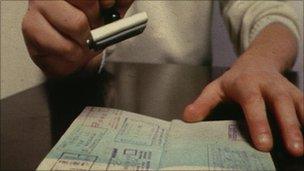Student migration curbs could cost UK £2.4bn
- Published

Visa cuts: Ministers say there are too many bogus students who are working in the UK
Plans to cut the number of foreign students arriving in the UK could cost £2.4bn more than they save, according to Home Office estimates.
The figures show the total costs could be £3.5bn, but that would be partially offset by savings of £1.1bn.
Officials estimate the measures will cut net migration by 230,000 by the end of the current parliament.
A Home Office spokesman said the measures are aimed at cutting immigration abuse by bogus students.
In the detailed figures on the plan's impact, external, Home Office officials estimate that the plans could cost the economy between £2.2bn and £4.8bn before taking into account savings. They say their best estimate of the net effect is £2.4bn.
The main costs would be an estimated £3.2bn loss from fewer students arriving and working in the UK either during or after their course, and a further loss of £170m in fees to educational institutions.
Savings would include an estimated £840m saving to public services, such as the NHS, by having to deal with fewer immigrants and a further £150m at the UK Border Agency.
Restrictions on numbers
Earlier this year, ministers said they would cut the number of student visas through greater scrutiny of private colleges and courses and tougher English language tests. There will also be restrictions on when students and their dependents can work.
The proposals are expected to eventually reduce the number of students by 75,000 a year, down from roughly 250,000 a year at present.
Officials say the figures are based on a worst-case scenario and it would be reasonable to assume that British workers would take jobs not being held by foreign students.
'Sledgehammer'
Immigration Minister Damian Green said: "We are radically reforming the immigration system to tackle abuse and bring net migration down to sustainable levels.
"These changes to the student visa system will create a system where every student coming to the UK attends a legitimate course at a legitimate institution.
"They will work alongside our other reforms of the work route and changes being planned for the settlement and the family routes."
But Pam Tatlow, chief executive of the Million+ think tank that represents new universities, said "the system did not need the government to take a sledgehammer to it", although it was necessary to crack down on bogus universities.
She said university leaders had been warning "for months" about the likely cost of the visa changes.
"At a time of economic difficulty, we should not be introducing reforms that will damage the UK or stop us attracting the talent and skills we need to rebuild our economy," she said.
Shadow home office minister Shabana Mahmood said the government's immigration policy was in "disarray".
The government had "succeeded in damaging the reputation of UK universities" and was not providing the UK Borders Agency with sufficient resources, she said.
"At the heart of Tory immigration policy is chaos, confusion and a failure to protect both the UK border and the economy," she said.
Taking action'
On Monday the government also released figures showing it had revoked the licences of 33 education providers since May 2010, saying they had failed to comply with the government's requirements.
These included Rockfield College, Torquay, which the Home Office said had claimed to be offering University of London degrees but could produce no evidence to prove it - although Martin Beech, the former principle of the college, told the BBC the claims were incorrect and the licence had been granted just two weeks before it was revoked.
In another case, the licence was revoked from St Georges College UK Ltd, which the Home Office said was unable to account for a "high proportion" of students who had applied for visas to study there, and the Waterloo School of English, which it said was "operating without premises".
Neither organisation could be reached for comment at the time of publication.
Another 32 providers have had their licences suspended.
Mr Green said the figures showed "that this government will not hesitate in taking action against educational providers who do not abide by our rules".
The government has long been trying to clamp down on so-called bogus colleges set up to get around visa rules under the pretence of offering courses.
- Published14 April 2011
- Published22 March 2011
- Published17 March 2011